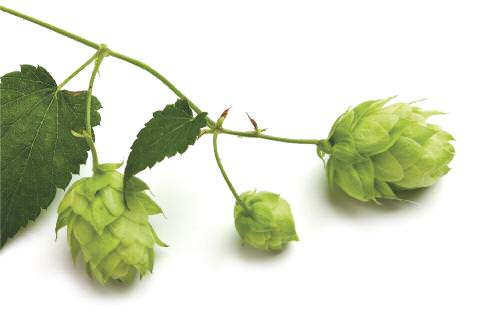drinkable reno tahoe
HOPS CROPS
Local growers test the waters for beer’s essential ingredient.
WRITTEN BY MARC TIAR
Like the bumper sticker says, “Nevada Agriculture: People Grow Stuff Here!” farms in the state turn out a wide variety of products, from onions to cantaloupes. Growing anything in our high desert climate takes careful consideration; what will offer enough return on the investment to make it worthwhile? So what’s the next potential growing opportunity for The Silver State? Hops.
The perennial vine plant grows rapidly each summer to heights of 20 feet or more up guy wires or other supports. Fragrant green, conical flowers are loaded with bitter, oil-bearing glands, and are harvested and dried in late summer. The main use of hops is in contributing bitterness, aroma, and flavor to beer. As the market for craft beer expands and brewers push the limits of how hoppy a beer can get, the demand for more hops — and more exotic varieties of the plant — is increasing.
“Nevada is the driest state in the nation and, until very recently, the fastest-growing state,” explains Jay Davison, a presenter at 2013’s Nevada Small Farm Conference and University of Nevada Cooperative Extension workshops and crops specialist. “Cities need water, and the obvious place to get it is from agriculture. In the future, whether it is from climate change, political decisions, or economic pressures, less water will be available for the agricultural producers of Nevada. Therefore, if they are to thrive, we must find and produce crops that generate more income while surviving on less water.”
Small local farmers have already started to dabble in growing hops. For instance, following 2012’s Nevada Small Farm Conference hops workshop, Wade Workman and his sister Vickie Detomasi of Workman Farms in Fallon, with Davison’s assistance, established a large-scale trial of four different varieties of hops. Now in their second growing season, the plants performed well in this year’s sunny Nevada summer. As hops take at least three seasons to get established and start to yield enough for a useful harvest, the assessment and real results of this trial still are to be determined. If the outlook continues to remain positive, Workman and Detomasi plan to add more acreage for hops production.
“Farmers are all businessmen, and farming is always a risky business,” says Ann Louhela, project director at Western Nevada College. “They’re willing to take a risk if they have enough facts to make an educated decision.”
At the same time, Davison is in the process of working with Urban Roots, a Reno charity, to submit a specialty crops grant to establish a test plot of additional hops varieties on the University of Nevada, Reno’s Main Station Farm. On a smaller scale, Art Farley, owner of Brasserie Saint James and Saint James Infirmary in Reno, has grown about 100 plants locally for several years for use at his brewpub. In addition, owners of The Brewer’s Cabinet are growing hops at the CARE Chest office in north Reno, with a future beer planned, using those hops; proceeds from its sale would benefit charity. And local residents also are even growing hops in their home gardens.
While Davison isn’t able to express a realistic forecast of Nevada competing with large-scale hops farms in Washington, he is optimistic about the possibility of a small hops industry thriving in the area.
Meanwhile, near Yerington and Fallon, barley is being grown, and some of it is being malted in Reno (see Beer’s Backbone in edible Reno-Tahoe’s fall 2011 issue). So besides an increased interest in tending hops, local barley and a malting business are in place to support the growing local beer business as well. Thus, as consumers continue to want a connection to their food’s origins, demand local products, and support farm-to-table concepts, beers made from entirely local ingredients is sure to be on the horizon.
Marc Tiar is a Reno-based librarian, family man, and home brewer, obsessed by all things beer.
Resources
Interested in growing your own hops? Look for rootstock, called rhizomes, in the spring at Reno Homebrewer (2335 Dickerson Road, Reno, 775-329-2537, Renohomebrewer.com). Some local nurseries also carry rhizomes or their starts.
To read more, check out The Homebrewer’s Garden: How to Easily Grow, Prepare, and Use Your Own Hops, Malts, Brewing Herbs by Joe and Dennis Fisher (Storey Publishing, 1998)
For a complete manual on small-scale and organic hop farming, visit www.Crannogales.com/hopsmanual.pdf.


